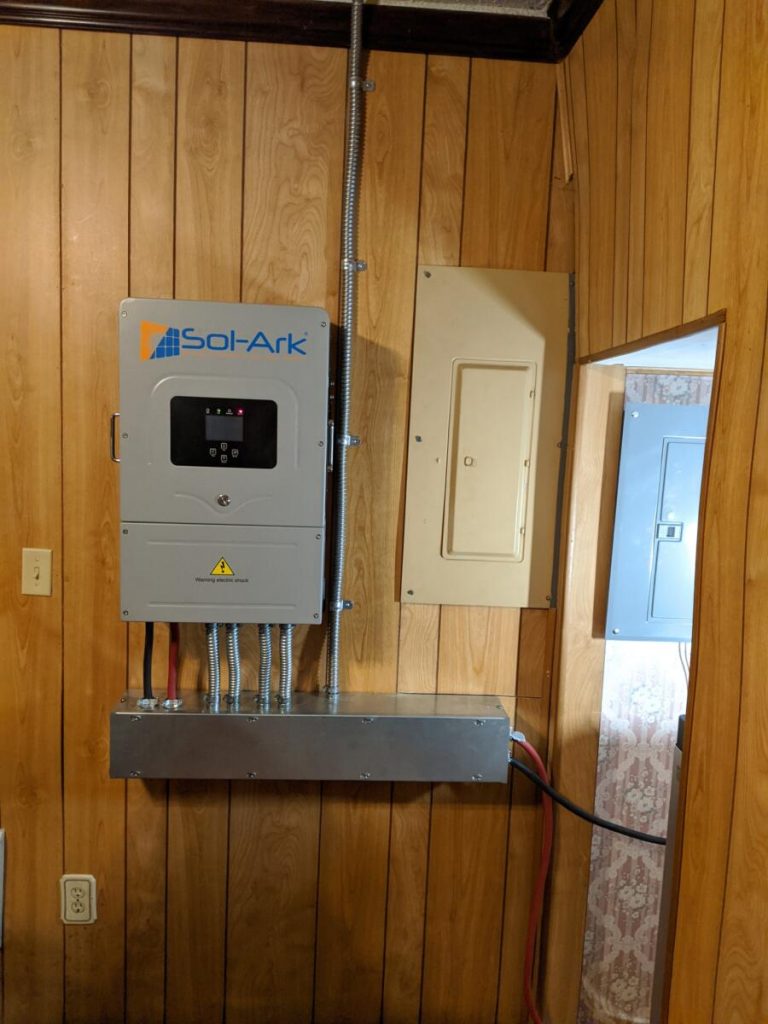The Best Type of Batteries for Solar Energy: Lithium Iron
Lithium Iron Phosphate (also known as LifeP04) batteries are the best overall option for storing electricity. The technology behind Lithium iron batteries is relatively new when compared to traditional lead acid batteries, but is quickly gaining popularity as an incredible solution for electricity storage. In fact, in 2019, the Nobel Prize for Chemistry was awarded to a group of scientists for their development related to lithium batteries.
Off Grid Solar Storage with Lithium Iron Batteries
Lithium iron batteries work well for both off grid solar and grid tie systems with battery storage. In the case of off grid batteries, lithium iron batteries are the best choice because they have the longest and cheapest overall battery cycle life.
Additionally, lithium batteries require no maintenance and are able to be drained and recharged to capacity daily. If your home or cabin runs solely on your solar power, then you will want to have a large LiFePO4 battery for the best performance and least amount of headaches.
Lithium Ion Battery Backup for Grid Tie Solar with Load Shifting
Load shifting is a way to cut down on the cost of your electricity bills by lowering your dependence on utility provided energy. Generally, this means that homeowners with solar panels will try to use the necessary high power appliances only during sunlight hours. If you install a battery on your grid tie solar energy system, then that means you will have additional solar electricity to use at night, rather than drawing from the grid.
Solar Batteries for Emergency Backup Power
If you are lucky enough to live in an area with favorable net metering rates, then there may be no need to use load shifting. This is because the excess electricity you produce is credited from your monthly or annual usage. However, if your system is tied to the grid, that means that it will stop functioning if the power grid goes down. For this reason, it is a good idea to consider a battery backup for emergency power.
If you want to install a battery for emergency backup, then you may not want to spend a lot of money if you are only going to use it a few times a year. If this is the case, we recommend an AGM or traditional lead acid battery for more cost effective solar storage.
Lithium Iron vs. AGM Batteries for Solar
The bottom line when considering between a lithium iron and an AGM battery for your solar storage is going to come down to purchase price. AGM and lead acid batteries are a tried and true electricity storage method that comes at a fraction of the cost of lithium. However, this is because lithium iron batteries typically last longer, have more usable amp hours (AGM batteries can only use about 50% of battery capacity), and are more efficient, safer, and lighter then AGM batteries.
Thanks to the longer lifespan, frequently used lithium batteries will also result in a cheaper cost per cycle then most AGM batteries. Some of the top of the line lithium batteries have warranties as long as 10 years or 6000 cycles.
Solar Battery Sizes
The size of your battery directly relates to the amount of solar energy you can store and use throughout the night or cloudy day. Below, you can see some of the most common solar battery sizes we install and what they can be used to power.
- 5.12 kWh – Fridge + Lights for short term power outage (load shifting for small homes)
- 10.24 kWh – Fridge + Lights + Other Appliances (load shifting for medium homes)
- 18.5 kWh – Fridge + Lights + Other Appliances + Light HVAC use (load shifting for large homes)
- 37 kWh – Large homes that want to operate as normal during grid outage (load shifting for xl homes)
Conclusion
We hope that this article helped explain some of the different technologies and applications of electricity storage in modern solar energy systems. If you are in Central Georgia, Southern Georgia, or Northern Florida and have any additional questions about your solar energy storage, feel free to give us a call today or contact us through our website at www.georgiasolarpros.com.

